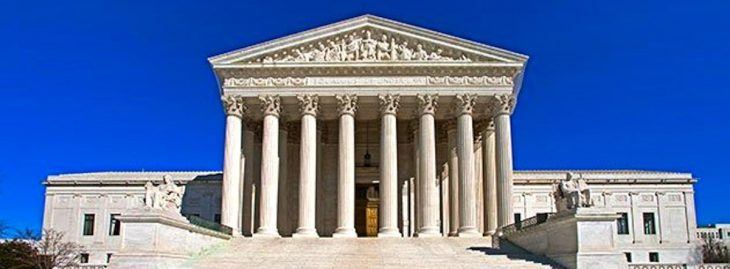Sen. Cotton, Rep. Westerman critical of U.S. Supreme Court decision on Texas abortion access law
by June 27, 2016 12:04 pm 346 views

A law approved by Texas legislators in 2013 that resulted in a significant reduction in the number of abortion facilities has been blocked with a 5-3 vote of the U.S. Supreme Court. Several Arkansas officials criticized the Court’s action.
Texas legislators said they crafted the law to prevent unsafe facilities in which women may be injured or killed during an abortion and in unsuccessful procedures might result in a newborn being killed outside the womb. Critics of the law said its intent was to reduce access to abortion facilities. Prior to the law, there were more than 40 abortion facilities in Texas, with the number dropping to around 20 in early 2016 with the state estimated to have around 10 in the coming years.
Several physicians and health care companies sued to block the law, saying it violated a woman’s right to health care. The case moved to the 5th U.S. Circuit Court of Appeals, which required a few exceptions but largely sided with the Texas law. It was the Appeals decision that the U.S. Supreme Court on Monday (June 27) issued the opinion.
Justices Stephen Breyer, Ruth Bader Ginsburg, Elena Kagan, Anthony Kennedy and Sonia Sotomayor voted to overturn the Appeals Court ruling. Dissenting were Chief Justice John Roberts and Justices Samuel Alito and Clarence Thomas.
COURT COMMENTARY
Writing for the majority opinion, Justice Breyer said the Texas law essentially created an “undue burden” on women seeking an abortion.
“More fundamentally, in the face of no threat to women’s health, Texas seeks to force women to travel long distances to get abortions in crammed-to-capacity superfacilities. Patients seeking these services are less likely to get the kind of individualized attention, serious conversation, and emotional support that doctors at less taxed facilities may have offered,” Breyer wrote in the ruling.
Continuing, he added: “We agree with the District Court that the surgical-center requirement, like the admitting-privileges requirement, provides few, if any, health benefits for women, poses a substantial obstacle to women seeking abortions, and constitutes an ‘undue burden’ on their constitutional right to do so.”
In a brief concurring opinion, Justice Ginsburg said the Texas law would harm and not help the health and safety of women seeking abortions.
“When a State severely limits access to safe and legal procedures, women in desperate circumstances may resort to unlicensed rogue practitioners, faute de mieux, at great risk to their health and safety,” she wrote.
Justice Thomas said in his dissent that the Court’s decision is based on a policy value rather than the constitutional law.
“This suit is possible only because the Court has allowed abortion clinics and physicians to invoke a putative constitutional right that does not belong to them – a woman’s right to abortion. … Unless the Court abides by one set of rules to adjudicate constitutional rights, it will continue reducing constitutional law to policy-driven value judgments until the last shreds of its legitimacy disappear,” Thomas wrote.
ARKANSAS REACTION
U.S. Rep. Bruce Westerman, R-Hot Springs, said the Court’s decision comes from “liberal elitists.”
“By striking down a Texas law designed to provide protections for the health and safety of women inside the state’s abortion facilities, these judges have struck at the very idea that all people are created equal and with unalienable rights. Once again under the guise of ‘choice,’ liberal elitists on the Supreme Court have shown their disdain for the Constitution and have once again tried to silence those of us who speak up for women and innocent babies who cannot speak for themselves,” Westerman said in a statement. “The Supreme Court may have ruled in favor of abortion providers today, but that will not stop states like Arkansas, Texas, and others from passing laws that are supported by its people. We will never stop fighting for the innocent and one day we will overcome this great injustice in America.”
U.S. Sen. Tom Cotton, R-Ark., said the Court’s decision will result in harm to women.
“By caving to the demands of abortion extremists who seek to normalize the ending of an innocent human life in the womb regardless of the dangers, the Supreme Court has left almost no room for common sense and simple decency in our nation’s approach to abortion. I deeply believe that Roe v. Wade was wrongly decided and that it should be—and will be—overturned someday. But before that time, we all should have been able to agree that duly elected representatives of the people can pass laws to protect women from unsafe abortion providers. That’s now impossible after this decision, and it will be to the detriment of the well-being of women across the nation,” Cotton said in a statement.
Arkansas Attorney General Leslie Rutledge (R) also said the Court’s decision puts women at risk.
“Arkansas, like Texas, has a profound interest in protecting the health of all women, but today’s unfortunate ruling puts that at risk,” said Attorney General Rutledge. “The Court has issued a decision that makes it even more challenging for a State to provide common sense health and safety regulations for abortion procedures. I will continue to analyze this opinion and evaluate what it means for Arkansas’s case at the Eighth Circuit.”
Rutledge has challenged a December 2015 ruling – Planned Parenthood v. Jegley – by the U.S. District Court for the Eastern District of Arkansas that temporarily halted enforcement of an Arkansas law changing the way physicians administer abortion medications.
The Eighth Circuit in June 2015 struck down Arkansas’ “Human Heartbeat Protection Act” which essentially banned abortions after 12 weeks.
